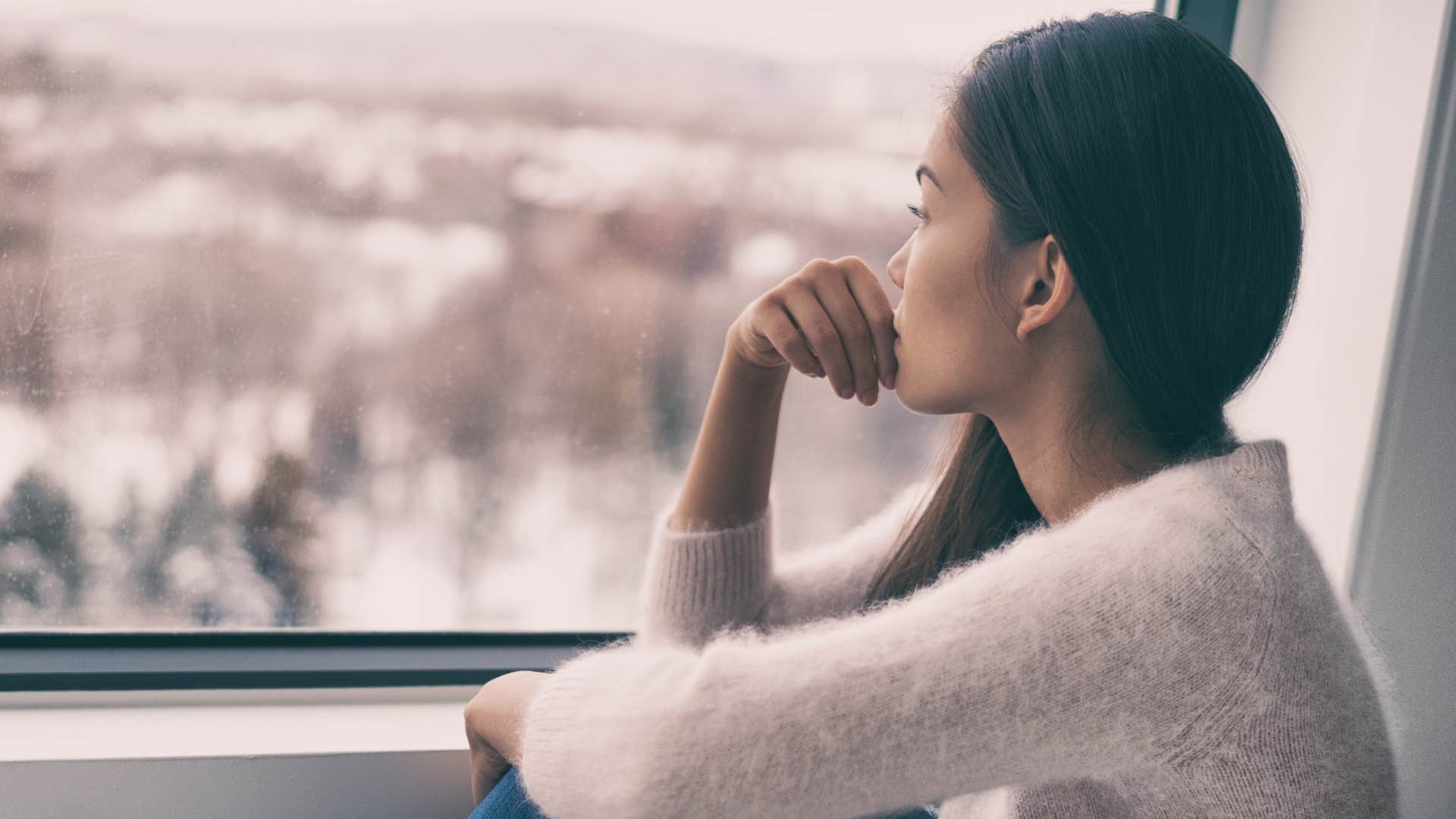People Raised By Gen Z Parents Will Probably Struggle With These 11 Things Later In Life
Gen Z is troubled in many ways, and they're passing that onto their kids.
 foto.sman | Shutterstock
foto.sman | Shutterstock Gen Z is finally growing up and becoming parents right before our eyes. The generation, which was born between the years of 1997 and 2012 is now roughly between the ages of 28 and 13. That's still a pretty large range, but it also means plenty of Gen Zers are adults. It's always nice to see what new skills each upcoming generation will bring to tasks like parenting, but some people worry that Gen Z's parenting skills aren't quite up to snuff.
Whether it's thinking for themselves or being dependent on social media, people raised by Gen Z parents will probably struggle with these things later in life. And as therapist Amelia Kelley pointed out, social media is just one pitfall for Gen Z parents, where "every move one makes is critiqued and everything is recorded and shared." She added, "[Gen Z parents] are placing pressure on themselves because of the environment they grew up in and part of that is this social comparison to other parents' 'perfect' lives portrayed on social media." The kids Gen Z are raising face unique challenges not only because of the time they're growing up in, but also because of who their parents are.
People raised by Gen Z parents will probably struggle with these 11 things later in life
1. Social skills
 fizkes | Shutterstock
fizkes | Shutterstock
Gen Z itself struggles with social skills, so it's not surprising that their children will likely do the same. Many people raised by Gen Z were born during or around the pandemic, which affected how they began their social lives.
Gen Zers are also known for giving their kids a screen to distract them when they're upset instead of really talking through the issue. This will no doubt stunt the social growth of their kids as well.
According to a Gallup survey, 45% of parents who have children in school believe the pandemic hindered their social development; 22% of those parents also felt like the issue persisted despite the pandemic being over. Psychologist Mary Rooney noted that children want friends, but often have a hard time making them.
Gen Z parents don't really know how to model good social skills for their children because they struggle with them, too. Stanford psychologist Jamil Zaki explained, "Communal activities don't have to be done in community, so we stay home. Going out has become like working out: we feel better after doing it, but it takes energy to get started."
It's much easier for Gen Zers to bury themselves in a phone than to be social, and they are teaching their children to do the same.
2. Dependence on technology
 Dragana Gordic | Shutterstock
Dragana Gordic | Shutterstock
Today's kids are widely known as "iPad kids" because of the way they can only be soothed with a screen when they're upset and how quick their parents are to hand them one to calm them down. Unfortunately, people raised by Gen Z parents will probably struggle with dependence on technology later in life.
Exposing them to technology so young can't be good for them, though. Indeed, the American Academy of Pediatrics says children under 2 shouldn't really have screen time at all unless they're on a video call with a loved one. From there, children 2 to 5 should have no more than one hour of screen time a day.
Very few parents follow these guidelines, though. And, admittedly, it's very hard to. We live in a world of screens, surrounded by phones, tablets, computers, TVs and more. So much of our culture is centered around what we can do with a screen that it's difficult to think of other activities for children to spend their time with. But presenting screens as a solution can lead to problems.
The American Psychiatric Association referred to technology dependence as "internet use disorder." Overuse of things like social media and online gaming can make one especially susceptible. They added that kids are at a particular danger for this kind of disorder because their brains are still in development. Because Gen Z is so attached to technology, they're pushing this onto their kids and putting them at risk.
3. No privacy online
 Viacheslav Lopatin | Shutterstock
Viacheslav Lopatin | Shutterstock
Another disadvantage of Gen Z being so connected to technology and the internet is that they frequently share their kids on social media. This goes beyond a simple congratulations post when they complete a school year or a happy birthday message, though.
Instead, today's young parents turn their kids into content that can be consumed by other social media users. They want to be influencers so badly that they film their kids' everyday lives and share them with strangers.
A study published in the Italian Journal of Pediatrics described this phenomenon as "sharenting," which "describes the increasingly popular habit of parents to share photos, videos or other information regarding their children on their social profiles, through online platforms." Researchers concluded that this behavior was most frequent among parents under the age of 35 — a good portion of which are Gen Z.
Obviously this is embarrassing, but it also has very dangerous implications. Leah Plunkett, part of the faculty at Harvard Law School and a "sharenting" expert, explained, "There is a thriving black market for personally identifiable information. Kids' Social Security numbers, when combined with date of birth, name and address, are often good targets for identity theft."
So, people raised by Gen Z can expect humiliating baby pictures plastered all over the internet while also having to deal with security concerns.
4. Boredom
 Maridav | Shutterstock
Maridav | Shutterstock
People raised by Gen Z parents will probably struggle with boredom, as they are bound to have very short attention spans. They'll be so used to instant gratification and getting anything they want with just a few taps of their fingers that they won't be able to handle waiting any longer for it.
Plus, the media they're consuming that's available at the tips of their fingers is mostly short-form. Why take the time to sit down and read a book when you could just watch a TikTok instead?
Being bored isn't a bad thing, though, according to psychiatrist Dr. Ashok Seshadri. "Kids are naturally curious and creative," he said. "Being bored helps them strengthen their creative muscles and learn to cope with feelings of boredom as they get older." And, of course, kids aren't the only ones who get bored, as 60% of American adults feel bored at least once a week.
The unfortunate thing is that today's kids aren't learning how to cope with boredom. Instead, there's always another device or app that they can glue their attention to. This will cause a problem when they get older.
All adults feel bored sometimes, and there's often nothing that can be done about it. People raised by Gen Z won't only get bored easily, but they also won't know how to handle that boredom, which could be a real issue.
5. Thinking for themselves
 fizkes | Shutterstock
fizkes | Shutterstock
There was a time, even before Gen Z's childhood, when you had to look something up in a giant encyclopedia or the library's catalog if you had a question. As these acts became automated, people wondered if younger generations were losing something special — skills that they needed.
Now, with the rise of AI, creativity is increasingly becoming stifled. It's hard to really think for yourself anymore without turning to the internet first.
Also troubling is the rise of influencers who explain the news in the way they would like it to be perceived. Instead of coming to their own conclusions, conclusions are drawn for today's kids by people who have no real qualifications to do so.
Critical thinking has basically flown out the window. Instead, TikTokers and Instagrammers share the information they supposedly need to know, and no thought is required on their part.
Harvard University lecturer and author Vikram Mansharamani said, "The biggest challenge we face in our expert- and technology-driven society is the ability to zoom out and see the Big Picture. When people make decisions, I encourage them to get multiple perspectives."
Having more than one perspective allows you to make an informed decision and make up your mind for yourself, something that is becoming more and more difficult in the world we live in.
6. Lack of discipline
 fizkes | Shutterstock
fizkes | Shutterstock
As people raised by Gen Z parents grow up, they may find themselves struggling with the results of the lack of discipline they received during childhood. This doesn't mean that Gen Zers are bad parents or don't know how to discipline their kids, but they are doing so in a very different way. Unlike generations before that tended to be a bit more strict, Gen Z is turning to gentle parenting.
Licensed clinical psychologist Emily Edlyn described it this way: "Gentle parenting prescribed an ideal first response to a child's behavior, but leaves us hanging for how to respond when the child does not actually change a behavior (like interrupting when you're on the phone)."
Gentle parenting is all about responding with a soft touch, even when a child needs something a bit more stern. As Edlynn noted, it has taken over social media, and parents who engage in gentle parenting often shame those who don't as they think their parenting style is superior.
Gentle parenting doesn't mean you never discipline your kids or teach them the right way to do things, but it's easy to confuse it with just letting your kids do whatever they want and not opposing them.
That's kind of the stereotypical reputation it's received, at least, so someone confused could easily use it wrong. This would mean not properly disciplining their children and leaving them to deal with the effects of a lack of discipline on their own.
7. Finances
 Kmpzzz | Shutterstock
Kmpzzz | Shutterstock
This seems like something of a generational curse Gen Z could pass on to their children. While it certainly wouldn't be true to make a blanket statement and say that all of Gen Z is bad with money, it's fair to say that they're having a hard time with it. They have student loan debt that has risen to previously unbelievable levels, and they're struggling to make it on their own in this lagging economy.
According to the Education Data Initiative, 28.2% of student loan borrowers are Gen Z. That's 13.1 million Gen Zers, or 43.5% of Gen Z adults. Additionally, a Bank of America Better Money Habits survey found that 46% of Gen Z has to rely on their parents or other family members for financial support.
You can't really blame Gen Z when you consider the economy they inherited, but with statistics like this, it makes one wonder if Gen Z will be able to give their children a stable economy to take on. Also, if Gen Z is having trouble with money and finding borrowing it to be a necessity, what kind of example is that setting for their children? People raised by Gen Z will probably struggle with money too because of this.
8. Setting emotional boundaries
 fizkes | Shutterstock
fizkes | Shutterstock
Gen Z is known for its proclivity for emotional openness. They like to be real with each other, and that's definitely not a bad thing. However, it could lead to some confusion for their kids.
If someone is raised in an environment in which they're encouraged to be as open as possible, it does call into question where emotional boundaries come in. If you're supposed to be open, does that mean you share everything? Where do you draw the line?
Health and wellness writer Chantelle Pattemore said, "A person with healthy boundaries understands that making their expectations clear helps in two ways: it establishes what behavior you will accept from other people, and it establishes what behavior other people can expect from you." Boundaries are essential for any relationship to thrive, whether it's romantic or platonic.
People often think of setting emotional boundaries as hard because they don't know how much to share, but for people who were raised by Gen Z, the problem could be the exact opposite. Instead, they don't know how little to share.
They suffer from oversharing, and they don't know how to stop. They watched their parents live very vulnerable lives, and they were encouraged to do the same, so now they don't know where boundaries can come in.
9. Unstructured childhood
 Prostock-studio | Shutterstock
Prostock-studio | Shutterstock
Gen Z is choosing to live life on their own terms. Many are turning to entrepreneurship so they can set their own working hours and travel the world. If they have kids, they just become a part of that lifestyle. The days of settling down once you started a family are really gone.
Instead, Gen Zers just keep living life the way they want to, even with a family. This could mean the kids they're raising are moving around more, doing alternative methods of schooling, not sticking close to family, and having a hard time making friends.
This can be a hard way to grow up. According to Seattle Children's, "Research confirms that when children have strong routines at home, they have an easier time in school with both learning and friendships. Kids who feel grounded in their home life can better regulate their emotions and cope with transitions. Growing up with structure also leads to greater resilience, which helps kids bounce back from sad or tough events and become even stronger."
People raised by Gen Z are growing up without the structure that previous generations enjoyed. They need that structure to develop properly and feel like they're growing up in a safe environment. This is bound to affect them as they reach adulthood and realize they missed out on a key part of childhood that would have really helped and grounded them.
10. Fear of being cancelled
 DimaBerlin | Shutterstock
DimaBerlin | Shutterstock
People raised by Gen Z parents will probably struggle with the fear of being canceled later in life because, these days, people are cancelled at the drop of a hat, and it doesn't look like that trend is changing anytime soon. If young people today disagree with someone or think someone handled a situation incorrectly, they don't give them a second chance. Instead, they just cancel them and watch everything go up in flames for them.
Health and science writer Lindsey Toler said that cancelling someone can sometimes have positive effects, like when a person or group that is hateful is truly called out on their behavior and held accountable. However, cancelling someone is akin to bullying them, and comes with the same consequences — isolation, loneliness, depression and more.
With how pervasive cancel culture has become, some people are tip-toeing around the internet, afraid to say anything that might be considered divisive. Kids today will pick up on this behavior and carry it with them. Because they witnessed so many people get canceled, they'll be afraid of the same thing happening to them, which will affect the way they live their lives.
11. Obsession with bad news
 Prostock-studio | Shutterstock
Prostock-studio | Shutterstock
In the world we live in today, there's a lot of bad things happening. You can't watch or read the news without seeing some story about something awful that has occurred. The world tends to focus on the bad and largely ignore the good.
Admittedly, the good things happening in the world do seem a bit underwhelming compared to the bad, but they still exist. They just don't get nearly as much coverage.
People are extremely aware of every bad news story that comes out — no one more so than Gen Z. With the way they live online, Gen Zers are the first to hear bad news and learn all about it. It can feel overwhelming to them, and, maybe even without realizing it, they're passing this sense of panic onto their kids. They wait for the next bad story with bated breath, and the people they're raising witness it all.
Psychiatrist Dr. Robert Bright said, "Repetitive and even near-constant exposure to stressful events, especially those beyond our control, can lead to feelings of hopelessness and depression. Sometimes the 'bad news' seems to be coming from every angle. It can be very overwhelming."
If something doesn't change, this inability to look away from the bad things happening in the world will be passed on to those being raised by Gen Z.
Mary-Faith Martinez is a writer with a bachelor's degree in English and Journalism who covers news, psychology, lifestyle, and human interest topics.

